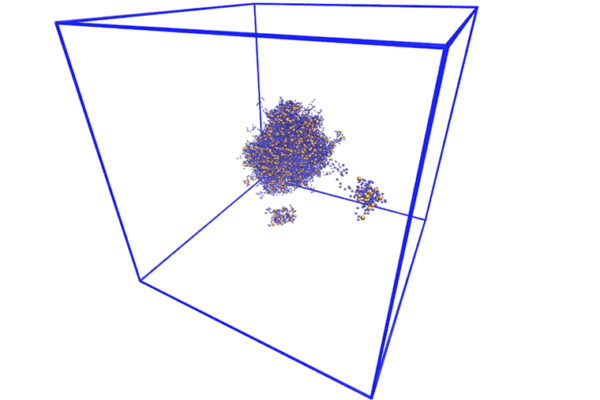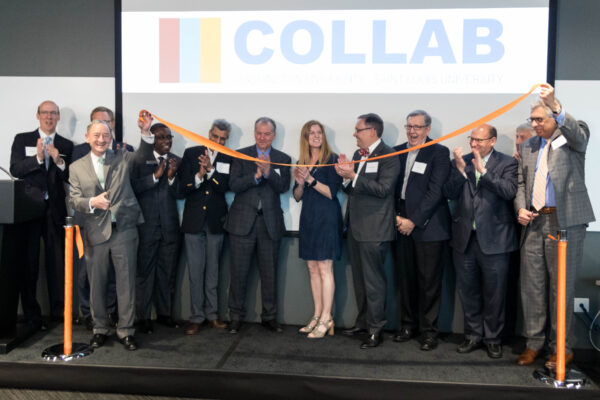Collaboration lets researchers ‘read’ proteins for new properties
A collaboration between the McKelvey School of Engineering and St. Jude Children’s Research Hospital uncovers the underlying rules that, when broken, contribute to neurodegenerative diseases such as ALS.
Washington University, Saint Louis University partner to grow region’s economy
The McKelvey School of Engineering at Washington University is joining forces with Saint Louis University to promote an innovation, entrepreneurship and growth in the region.
Marking territory stifles workplace creativity
Companies often pride themselves on creating a collaborative culture that encourages the free-flow of ideas between colleagues. But a recent study co-authored by Olin Business School’s Markus Baer shows that territorial marking in the office can quickly squash much sought-after workplace creativity.
Mail operations share space in new building
Some of the Danforth Campus, School of Medicine and BJC HealthCare mail operations will share space beginning June 15 to reduce costs and improve efficiency.
Want to kill creativity of women in teams? Fire up the competition
Women tend to outperform men when it comes to collaboration and creativity in small working groups, but force teams to go head to head in highly competitive environments and the benefits of a female approach are soon reversed, suggests new research from Washington University in St. Louis.
Improving stroke care focus of new collaboration
Stroke experts at Washington University in St. Louis, Barnes-Jewish Hospital and The Rehabilitation Institute of St. Louis are forming a collaborative group to ensure that clinicians share data to improve patient care and advance the development of new treatments.
Biologist offers WUSTL program as way to incorporate genomics into curricula
The next generation of consumers will be the true beneficiaries of the promise of genomics. But how will they make informed choices in a world resplendent with genomics products, including tools to predict disease and the engineered drugs to treat those diseases?
The answer, says Sarah C.R. Elgin, Ph.D., WUSTL professor of biology in Arts & Sciences, is more genetics and genomics at every level of American education.
Washington University, China’s ShanDong University will collaborate on Moon data
Photo courtesy NASAAmid a bevy of international space exploration missions to the Moon, the Washington University Department of Earth and Planetary Sciences in Arts & Sciences and ShanDong University at WeiHai (SDU at WH) in Mainland China have agreed to cooperate on scientific research and joint training of students in the two institutions. The agreement comes less than a year away from the planned launch of Chang’E-1, the Chinese lunar probe project, in April, 2007. The goals of China’s Chang’E-1 project are first to place a satellite into orbit around the Moon in 2007; then to land an unmanned vehicle on the Moon by 2010; and to collect samples of lunar soil with an unmanned vehicle by 2020. The spacecraft carries five instruments to image and measure different features of the Moon. Within two years, three additional missions from the United States, India and Japan will generate a furious flurry of data that will keep space scientists enthralled for the better part of the next decade. The Japanese Selene mission is scheduled to launch in the summer of 2007, the Indian Chandrayaan-1 in late 2007 or early 2008, and the United States’ Lunar Reconnaissance Orbiter for October 2008. More…
WUSTL researchers make discoveries in first collaboration with Libyan scientists
Josh Smith in the Libyan desert.They’re back! Joshua Smith, Ph.D., assistant professor of earth and planetary sciences in Arts & Sciences, and D. Tab Rasmussen, Ph.D., professor of anthropology, both in Arts & Sciences, are stateside, teaching at Washington University after returning from what is thought to be the first-ever collaborative paleontological expedition between American and Libyan scientists. Smith and Rasmussen were in Libya for just three weeks in August of 2005. They were in the field for only 10 days, and they and their colleagues visited 13 new places that have produced Cretaceous-aged vertebrate fossils. They found fossils of sharks, bony fish, crocodiles and turtles.



